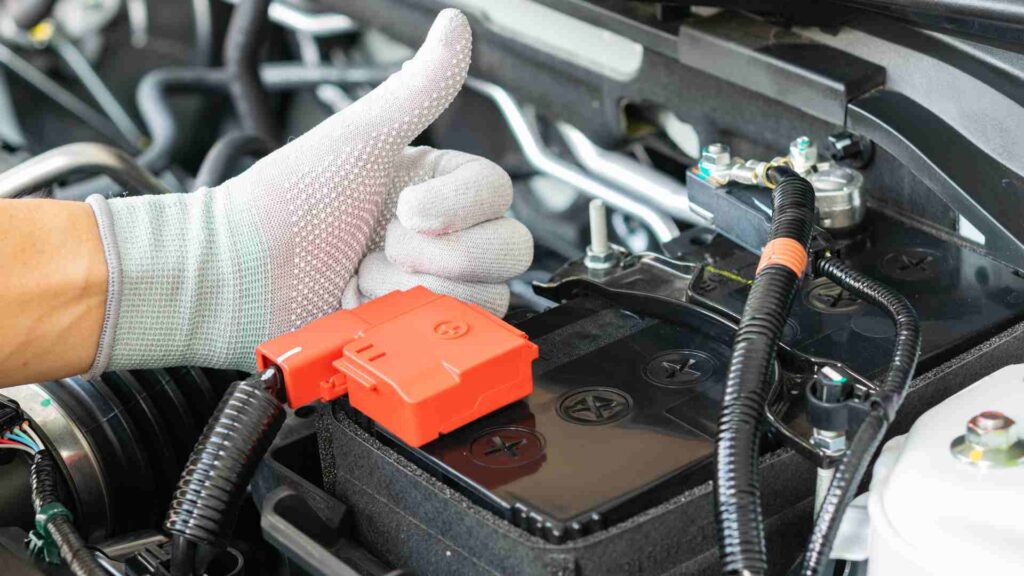9 Signs of a Bad Car Battery: When You Should Get A Car Battery Service
Car batteries are the unnoticed heroes of our vehicles, powering everything from the starter to the entertainment system. However, like all things, they don’t last forever. Recognizing the early warnings of battery failure can save you from being stranded and can ensure that your vehicle runs smoothly. In this article, we’ll explore 9 signs of a bad car battery and guide you on how to test a car battery to determine when you should get a car battery service.
Keep in mind that your car is a major investment, so consider taking your car to YST Auto Service for full car maintenance. YST Auto Service is your one-stop destination auto repair garage in Mississauga, Toronto. Our professional mechanics can identify potential issues and ensure your vehicle is ready for the changing season.
At YST Auto Service, we deliver only the highest quality car services and repairs. We provide all manner of auto repair and car maintenance services to keep your vehicle running strong and smooth. From keeping proper tire traction to ensuring your battery is up to the task, these tips will help you enjoy the autumn drive with confidence and comfort.
9 Signs of a Bad Car Battery: When You Should Get A Car Battery Service
9 Signs of a Bad Car Battery: Recognizing the Warning Signals
Understanding the warning signals of a failing car battery is important for any car owner. Here are nine prominent indicators that your battery might be on its last legs:
Slow Engine Crank: If your engine cranks slower than usual when starting, your battery may not be providing enough power. Sluggishness is often the first sign of battery trouble and can be indicative of internal wear.
Electrical Issues: Flickering headlights, malfunctioning power windows, or dashboard warning lights can indicate a failing battery. If multiple electrical components are acting up, it’s time to investigate. A consistent drop in voltage can lead to further complications with your vehicle’s electrical system.
Corrosion: A build-up of white, ashy substance around the battery terminals is a sign of corrosion. While this may not directly mean your battery is dead, it can affect performance and is worth cleaning up. Corrosion can also prevent the battery from charging properly, leading to more significant issues down the line.
Bad Smell: A leaking battery can emit a rotten egg or sulphur smell. This indicates that the battery may be leaking acid, which can be hazardous. If you notice this odour, you should proceed with caution because battery acid can cause damage and is hazardous to your health.
Age of the Battery: Most car batteries last between 3 to 5 years. If your battery is nearing this age, it’s wise to monitor its performance closely. A battery that has exceeded its lifespan is more likely to fail, so consider a proactive replacement.
Frequent Jump Starts: If you find yourself needing to jump-start your car regularly, it’s a clear signal that your battery is struggling to hold a charge. This inconvenience can escalate into a complete battery failure, leaving you stranded.
Battery Indicator Light: Many modern cars are equipped with a battery warning light on the dashboard. If this light illuminates, it suggests that your charging system may be malfunctioning. Ignoring this warning can lead to more severe electrical system failures.
Extreme Weather Impact: Batteries are sensitive to temperature. If you observe performance drops in extreme cold or heat, it could mean that your battery is nearing its end. Cold conditions can cause your battery to lose charge faster, but high temperatures might induce battery fluid evaporation.
Swelling or Bulging Case: A swollen battery case can indicate internal damage due to overheating. This is a major warning indication that requires quick care since a bloated battery might leak or even explode.
Recognizing these warning signs can help you avoid being left behind. If you notice any of these signs, it is time to schedule car battery service before it is too late!

How Long Does a Car Battery Last?
Understanding how long a car battery lasts is essential for every car owner. While the average lifespan is between 3 and 5 years, several factors can influence your battery’s lifespan:
Climate Conditions: Extreme heat or cold can significantly affect battery performance. In hot climates, the heat can cause evaporation of battery fluid, while cold weather can reduce the battery’s ability to start the engine. If you reside in a location with extreme seasonal variations, consider purchasing a battery that is appropriate for your climate.
Driving Habits: Frequent short trips prevent the battery from fully recharging. Longer drives allow the alternator to properly recharge the battery, extending its life. If your daily schedule includes long commutes, your battery may last longer than someone who only travels short distances.
Battery Maintenance: Battery maintenance includes cleaning terminals, checking fluid levels, and maintaining secure connections to extend battery life. Neglecting maintenance might cause premature failure. Consider scheduling biannual checks to keep your battery in top shape.
Electrical Loads: The more gadgets you use in your vehicle (such as heated seats, GPS, or music systems), the greater the demand on the battery. High electrical demands may limit its longevity. If you routinely use numerous electrical systems at the same time, monitor the performance of your battery.
Battery Quality: Investing in a high-quality battery from a recognized manufacturer can result in a longer lifespan than less expensive options. Conduct research and read reviews to choose the best fit for your car.
How to Test a Car Battery: A Practical Guide for Car Owners
Understanding how to test your car battery allows you to avoid potential issues and keep your vehicle running smoothly. You can either perform a basic battery test at home or have it done professionally. Here’s a practical guide to assist you:
Tools Needed
- Multimeter (or a voltage tester): This tool measures the battery’s voltage and helps assess its charge.
- Battery terminal cleaner: This is optional but useful for cleaning any corrosion from the terminals.
- Safety gloves and goggles: Recommended for protection against potential acid spills.
Step-by-Step Testing
Safety First: Before you begin, ensure your vehicle is off. Wear safety gear to protect yourself from any potential acid spills that could occur during testing.
Inspect the Battery: Check for any visible signs of wear and tear. Look for corrosion or leaks, as these can affect your battery’s performance. If there’s significant corrosion, it might indicate a failing battery or poor connections.
Clean the Terminals: If you notice corrosion, use a battery terminal cleaner or a mixture of baking soda and water to clean the terminals. This can improve the connection and allow for better charging.
Set Up the Multimeter: Turn your multimeter to the DC voltage setting (20 volts is usually sufficient for testing automotive batteries).
Connect the Multimeter: Touch the red probe to the positive terminal and the black probe to the negative terminal of the battery. Ensure a secure connection to get an accurate reading.
Read the Voltage: A healthy, fully charged battery should read between 12.4 and 12.7 volts. If the reading is below 12.4 volts, your battery is likely weak and may need charging or replacement. If it reads below 12 volts, it’s critically low and may not start your vehicle.
Load Test: If you want to delve deeper, you can perform a load test. This involves applying a specific load to the battery (usually around half its CCA rating) and observing how it holds up under stress. A battery that drops below 9.6 volts during a load test is likely failing.
Seek Professional Help: If you’re uncertain about the results or lack the tools for a thorough test, consider taking your battery to a professional mechanic for a comprehensive car battery service. They can provide a more exhaustive test, often using specialized equipment to assess battery health accurately.
When to Replace Car Battery
Understanding when to replace your car battery involves knowing its lifespan and the factors that influence it. Here’s a breakdown:
Lifespan of a Car Battery
Average Lifespan: Generally, car batteries last between 3 to 5 years, but this can vary based on usage, climate, and maintenance. Some high-performance batteries may last longer, while budget options may fail sooner.
Driving Habits: Frequent short trips can prevent your battery from fully charging, leading to a shorter lifespan. Longer drives allow for a complete charge cycle, which is vital for battery health.
Climate Impact: Extreme temperatures can affect battery life. Hot weather can cause evaporation of battery fluid, while cold weather can reduce its efficiency and starting power. In regions with harsh winters or scorching summers, batteries may require replacement sooner.
Battery Maintenance: Regular checks and maintenance can prolong battery life. Cleaning terminals, ensuring secure connections, and checking fluid levels (for non-sealed batteries) are all essential practices.
Signs It’s Time for Replacement
Age: If your battery is older than 3 years and showing signs of weakness, consider a replacement. Many manufacturers recommend testing batteries that are approaching the 3-year mark to gauge their health.
Frequent Jump-Starts: If you find yourself needing to jump-start your car regularly, it’s a clear signal that your battery is struggling to hold a charge. This inconvenience can escalate into a complete battery failure, leaving you stranded.
Load Test Results: If your battery fails a load test, it’s time for a new one. A battery that cannot maintain voltage under load is unlikely to perform reliably.
Professional Car Battery Service
When in doubt, consult a professional. They can provide insights into your battery’s health and recommend whether it’s time for a replacement. Many auto shops offer free battery tests, allowing you to make informed decisions without incurring additional costs.
Car Battery Replacement Cost
When it comes to car battery replacement costs, it’s essential to know what to expect. Here’s a detailed look at the expenses you might encounter:
Average Costs
Battery Prices: The average cost of a car battery ranges from $80 to $200, depending on the type and brand. Premium batteries may cost more but often come with longer warranties and better performance.
Labour Charges: If you’re having the battery replaced at a shop, labour costs can add another $50 to $120. Some shops may offer free installation with the purchase of a battery, which can save you money.
Additional Services: Some mechanics may include additional car battery services like cleaning the terminals or checking the charging system, which could impact overall costs. Be sure to ask about any bundled services that might be included with your battery purchase.
Factors Influencing Costs
Type of Battery: Lead-acid batteries are generally cheaper, while AGM (Absorbent Glass Mat) batteries tend to be pricier but offer better performance and longevity. The choice of battery type depends on your vehicle’s requirements and your budget.
Vehicle Type: Larger vehicles or those with advanced electrical systems may require more expensive batteries. Luxury or performance vehicles often have specialized battery needs, which can drive up costs.
Location: Prices can vary based on geographic location and local demand. Larger metropolitan areas may have higher prices than rural areas, impacting your overall expenses.
Warranty Considerations: Some batteries come with extended warranties, which may be more expensive up front but might save you money in the long run if a replacement is required before the warranty expires.
Understanding the cost of auto battery replacement allows you to plan ahead and keep your vehicle reliable. Knowing when to change your battery will help you avoid the hassle of being stranded. To avoid unexpected expenses, it’s wise to budget for a battery replacement every 3 to 5 years. Regular testing and maintenance can help you anticipate the need for a new battery, making the process smoother.
Keep an eye on your battery age and performance. If it’s nearing the 3-year mark, start monitoring for any signs of weakness. Routine tests can help you stay ahead of potential issues. Many drivers opt for seasonal checks, especially before winter or summer, to ensure their battery is in optimal condition.
Recognizing the signs of a bad car battery and knowing how to test it can help you avoid unexpected breakdowns and pricey repairs. Regular maintenance, awareness of your battery’s lifespan, and understanding replacement costs are all crucial aspects of vehicle ownership. Staying knowledgeable and proactive will guarantee that your car battery remains a reliable ally on all of your driving experiences Don’t wait for a breakdown—take charge of your battery’s health today!
Keep in mind that your car is a major investment, so consider taking your car to YST Auto Service for full car maintenance. YST Auto Service is your one-stop destination auto repair garage in Mississauga, Toronto. Our professional mechanics can identify potential issues and ensure your vehicle is ready for the changing season.
At YST Auto Service, we deliver only the highest quality car services and repairs. We provide all manner of auto repair and car maintenance services to keep your vehicle running strong and smooth. From keeping proper tire traction to ensuring your battery is up to the task, these tips will help you enjoy the autumn drive with confidence and comfort.





